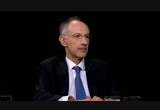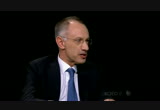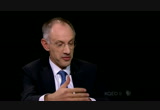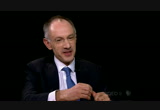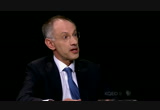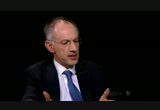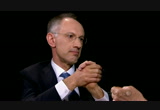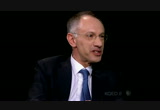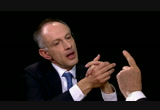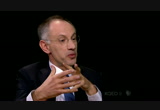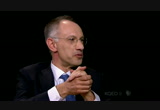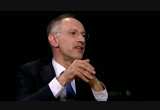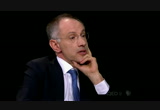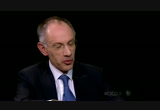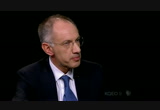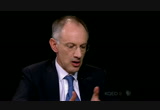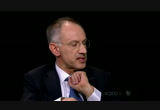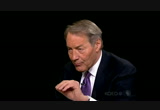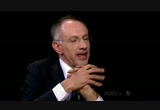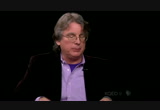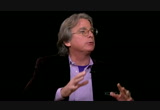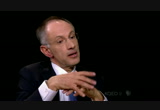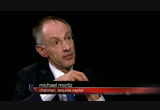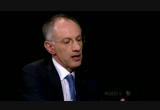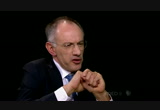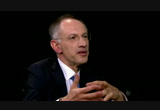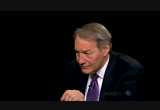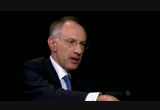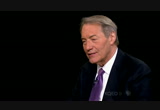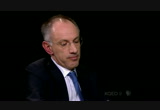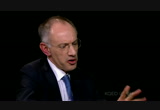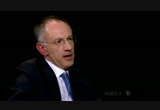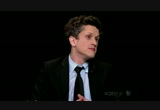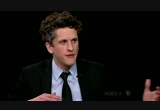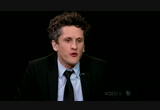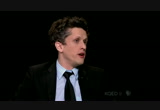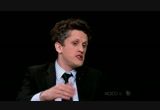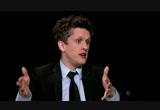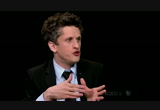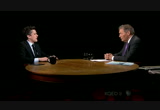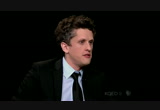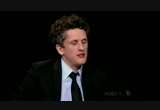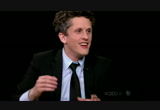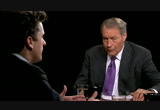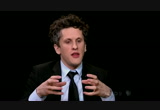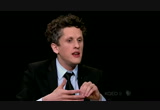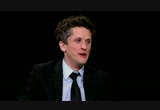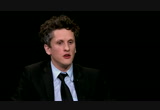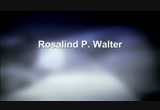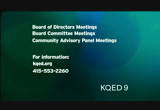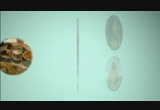tv Charlie Rose PBS February 18, 2013 12:00pm-1:00pm PST
12:00 pm
captioning sponsored by rose communications from our studios in new york city, this is charlie rose. >> mike more sits here, the chairman of sequoia capital it is one of silicon valley's most prominent venture capital firms it has made successful investments in google, and linked in, among others he started his career as a journalist at "time" magazine. i'm pleased to have him here at the table for the first time. >> thank you. >> rose: it he is a pleasure to you have at the table.
12:01 pm
>> likewise. >> rose: i want to go back to europement tell me about your grandfather and your father and coming here. >> so my-- both my parents were born in nazi, germany. or they were born in ger nanny. like a lot of other jews obviously the future wasn't there for them. and their parents organized their depar ture in the mid 1930s to britain. my mother and father didn't know each other at that point. they met later in britain. and both my mother and my father were lucky enough to get scholarships to attend high school in the case of my mother and then high school and university in the case of my father. and my mother's parents
12:02 pm
escaped from germany right at the end of august of 1939. and my father's parents, like a lot of the rest of the family never escaped. they were murdered. and like millions of others. but then my mother and father both made their lives after the end of world war ii in great britain which is where i was born and educated and raised until i came to america. >> rose: well, raised where? >> i was-- . >> rose: in cardiff. >> in cardiff, in south wales, which is a city of-- it's the largest city in wales but it's about 200,000 people on the welsh coast about oh, 40 miles away from where dylan thomas and richard burton were born and about 15 miles from where that other famous welshman tom jones was born. >> rose: and what got you to oxford? >> how did you get to oxford?
12:03 pm
>> my, i went to a regular high school in britain. and there were teachers who were encouraging of students to try their best. and also my father had been educated at oxford on a scholarship. so it, while it seemed unattainable for oxford or cambridge seemed unattainable for most of my contemporaries when i was at high school, it seems within reach at least for me. so i gave it a shot. and wound up there in the early 1970s. but i enjoyed the extra mural life there and got involved with the university magazine. >> rose: yes. >> and enjoyed that a lot. and -- >> liked to write? >> and also it was people were very kind, politicians in particular were very kind
12:04 pm
and they, it was easy to get an interview with fairly illustrious people. so with the university magazine we used to chuck around. we would see all these well-known people and then write about them it was sort of my first entree into that world and i loved it. >> loved journalism. >> yes, absolutely. because every, this little magazine appeared fort nightly and every fort night we had 32 pages which we didn't know what to do with except we had four pages of advertising from a chain called mother care. whose owner very kindly took care of the sort of rinky dink financial side of this magazine and we had to fill it up with editorial copies. >> what made you decide to go to the united states. >> i had one of these weird coincidences of life. there was a gentleman who, is today unknown in america
12:05 pm
and isn't very well-known in britain any more because he died some years ago. but his name was bill deeds. and he wased editor of the daily telegraph newspaper. and he was a giant in british journalism. he had been the character on which evelyn war had rested his novel scoop. and i went to see him to apply for a job on feet street. after, for after i left university. and the trouble was that they were very strict union rules. and the union rules in britain forbad the broad streets of fleet street from hiring undergrads directly from university. and you had to go and work for several years on a small provincial newspaper before you could be allowed to work on feet street. and deed said were he my age he wouldn't waste his time
12:06 pm
with feet street. we go to america. and that was what convinced me to try my luck here. >> rose: i know some people who are saying, you know, if i was a young entrepreneur coming out of business school today i would go to asia. >> i think most entrepreneurs don't come out of business school, they come out of engineering schools. >> rose: what skills do you wish you had that would enable you to better do your job in venture capital? >> oh, any number of skills. and more particularly, knowledge that i wish that i had that i don't possess. and we invest across, in a fairly broad with ther front of technology. but to be really well educated and a specialist in any one of those things, requires a very deep immersion, deep immersion software or bioinfomatics or
12:07 pm
the various underlying sciences. and i wish i had had a better formal scientific education when i was younger. that more than anything would have helped me, i think. >> rose: here's you what said, my undergraduate degree was in history. i wish i would have been smart enough to excel in math, fitics-- physics or biology because the voyagers and adventurers come from there. >> that's where they start from. and yes, i don't quarrel with any part of that sentiment. i think those are today's voyagers. and they start off with a grounding in those particular sciences. >> rose: and do the business school grads become transactional people and go to wall street and go to financial institutions? >> it's obviously, charlie, unfair to paint a
12:08 pm
broad-brush here. and there's some very talented people who come out of the business schools. but-- and who join these companies. and a very vital parts of helping the companies get off the ground. and there are a number of them who have started companies that became significant. but the germ of an idea, of a breakthrough in technology, of, you know, an evolution in a realm of science does not come out of a business school curriculum. it come its out of a laboratory or a math lecture or physics tutorial of some sort. and i think that's where, where all say in the case of somebody many years ago like bill gates from an avocation that he had as a teenager, that he just deeply immersed himself. >> yeah. >> and decided that it was more important to go do it than stay in college. >> it was his calling. he was not unlike a lot of other, or a number of other
12:09 pm
remarkable people in their teens. whether they went on to become a musician or an artist, or perhaps an entrepreneur. they discovered their, or perhaps like warren buffett, without discovered investing when he was 11 or 12. these people, whether they were using piano key, paintbrush or computer keyboard, pencil paper in the case of warren buffett, they discovered their calling at a young age and they fell in love with it. and that is a very common theme for the people that we encounter as they then start to develop idea its. >> rose: your job is to find them and test their idea. >> yeah. >> rose: and rigorous examination of its potential. >> and then to be business partners with them for a very long time. because i don't think it's an accident that many of these people who start something when they're very
12:10 pm
young then spend decades building those businesses. >> rose: i will come back to that. because that all came after you were, went to sequoia. so you're in london. you talk to the man at the daily times and he says i would go to america. that is where i would go. >> yeah. >> rose: so you come here. >> i came here and i couldn't afford to come here. so i applied for a bunch of scholarships to american universities and luckily enough got one that took me to the university of pennsylvania. >> rose: wharton. >> well, actually, no. not originally. it was for a masters in history. and then i wasn't too happy with the first few weeks of that program. and was wondering what else to do. because i knew i wanted to be in america. and they were very kind and let me transfer into the business school. but the very best thing that happened to me there was
12:11 pm
having-- being in a class with the author philip roth. so my binding memory of the university of pennsylvania is being introduced to philip roth and he had these people like norman mailer and other people who would come through the class and that was just fantastic. >> rose: you make your way to "time" magazine. >> yes. >> rose: and you write about steve jobs. >> actually before that, i did write about steve jobs. before that i went to detroit, for a year of battle hardening in 1979 as the automobile industry was collapsing. and it was-- and that was where, actually, i co-authored a book about the chrysler corporation and lee iacocca who was this larger-than-life figure who obviously was a house hold name 25, 30 years ago. and that was my introduction to mainstream journalism. and then i moved to california. first to los angeles.
12:12 pm
and where i found myself gravitating to northern california to do stories about all these little companies that nobody had heard of, you know, genentech was private. apple was just about public. microsoft was still private company. and i started writing about them and gradually got more interested. and then eventually wound up moving to san francisco with time. >> and what was steve jobs like then? >>. >> it's probably, steve is probably an example of like many, many people, of the truism that you never take the boy out of the man. and so many of the traits that people became familiar with in the last few years of his life were on full
12:13 pm
display 30 years ago. spectacular communicator, a wonderful salesman. a man on messianic mission when he set his mind to srtion, a task master, a disciplinarian, a man who is difficult to please. but also-- and very difficult, obviously as well. but also an extraordinarily mesmerizing figment captivating figure. probably without doubt the most interesting person i met, ever in your life. >> clearly. >> it was, yes, no doubt, no doubt. >> rose: you became friends? >> no, we had a-- he wanted me to write a flattering book about apple. i had approached him about writing a book about apple in the early 1980s when nothing had been written about it. but i was interested in trying to get into really
12:14 pm
understanding how difficult it was to build a company. and i wasn't interested in the public aspects or apple as a public company. i was interested in the private years from when they had the idea to going through all the ups and downs, all the stuff that was outside of the public view. steve really wanted a piece of puffery about the birth of the macintosh computer. which i understood that. but that's not the book that i wanted to write. so i wrote a book about apple. and the along the way there were a couple of stories about him that had appeared in "time" magazine that more than irritated him. and so after that relationship became distant. and you know, in the last decade or so it was interhittant and just related to business, to
12:15 pm
business things. but we weren't friends. >> rose: why did you go to sequoia capital. you're a journalist. you're a writer. >> there was some -- >> you were interested in the way things work and how things happen. >> i don't know whether or not this is true. but somewhere i remember reading that earnest hemmingway said journalism, and i beg your pardon here, charlie, but journalism is not a place to be for people over the age of 30. and i think he was wrong about that but for some reason it lodged in my 29-year-old brain. >> rose: yeah. >> and i had got very interested in all these young and private companies and all the people surrounding them. and i met a lot of them thanks to "time" magazine. and decided that i wanted a change. and i left "time" not to
12:16 pm
join sequoia capital but to start a company with a friend of mine from "the wall street journal." and we started a little publishing company which was what you expect two former journalists without didn't know anything. so we just did what we knew. and i did that for a time. but then it was clear to me it was going to be a nice little business am but never a large business. and many, many years later dow jones wound up buying it. but hi gone, by then had gone on and joined sequoia capital. >> so when you joined sequoia capital it's been hugely successful. it's now legendary from several other venture capital firms. what's made it successful? >> google, linkedin, youtube, pay pal, yahoo!, zappos. >> and you, very rich. >> i think we've always been afraid of going out of
12:17 pm
business. >> rose: really. >> fear an competitive drive, really. only ot paranoid survive. >> someone famous said that. but there's a lot of truth to that. because when we become a business partner of a young company, and it doesn't always work out like this, but we go into it with the hopes that this company can endure for-- we can, it can be built and then it can be one of these rare enduring companies. now obviously the majority of companies don't attain that. but that's given us the opportunity to think very hard about what it is that causes some companies to prosper for a very long time. and others to have their moment in the sun and then fade away. and what happens to a company can happen to a firm like sequoia capital as well. so we've worked very, very
12:18 pm
hard to think about what does it take to excel in every decade of the business that we've been in. because it's hard to have a fellow called don ballantine started sequoia capital if 1974. that's a long, long time ago. it's before apple, before atari, before many of the companies that have in the interim come and gone. and so we have worked hard on trying to figure out how we make sequoia capital endure. and i think that's been the reason why we've been able to do what we've been able to do. because we've assumed that tomorrow isn't like yesterday. we can't afford to rest on our laurels. we can't be complacent. we can't assume that yesterday's success translates into tomorrow's good fortune. >> rose: is venture capital as attractive today as it
12:19 pm
was ten years ago? >> it's probably more attractive oddly enough. >> and is it doing as well today as it was doing when you were bringing onstream google and companies like that? >> it's a businesses that's always had the return of, the investment returns concentrated in very few hands. so many of the companies don't succeed. they don't flourish, they don't become one of these enduring companies. many the firms, venture firms associated with these companies don't succeed. they're around for five years or 10 years but not for 40 or 50 years. but for people who know what they're doing in silicon valley and elsewhere, where in good pockets of venture capital around the world, the business is actually oddly enough better. and it's better because the investment menu is longer than it's ever been. and the investment menu is longer than it's ever been because technology has seeped into more and more
12:20 pm
crevices and nooks of the economy. because when i started at sequoia capital there's no way that we would have considered investing in a payments company, a financial services company, a media company. an advertising company. all of those sorts of things we've invested in quite happily in the last 15 years. it was technology and-- seeping out everywhere. >> rose: at the core of every business. >> exactly. and where technology goes, we follow. >> rose: you've been outspoken or at least you've made public statements saying wait, don't be so critical of apple because of the decline in the stock price. you believe in the future of apple and there's nothing, no reason not to be excited about the continued growth of that company. >> i'm not a soothsayer. all i was trying to do in the pandemonium after they
12:21 pm
announced their results recently was just try to paint a picture of realistic expectations for a company that is now as large as apple is. and-- . >> rose: second largest company in the world. >> and the point that i was making was that if the growth rate of the last five years was to continue, by 2020 it would be equivalent in size to somewhere between between the gdp of france and gdp of germany and people should be realistic about their future growth expectations, for the company. >> rose: and you think that their growth expectations -- >> their growth expectations were unrealistic. you cannot, you know, apple in the last quarter was running at a 200-- 200 billion dollars a year annualized sales rate.
12:22 pm
one fifth of a trillion dollars. you can't grow that at 45% a year add infinite up. >> it's physically impossible. >> the physics of it. >> that was the only point i was trying to make was just to help give people a sense of perspective. >> i want to take a look. i want you to talk about google and how you see it this is roger here on this program talking about the challenge for google, a company that probably has given you as good a returns you've ever received. >> if you look at what they're trying to do with android which is their mobile operating system, google is basically saying we're the alternative to apple. and we're going to have every operator making their own device. they're doing basically what microsoft did with windows. giving a lot of latitude to people who make changes. the problem is that there are no economic incentives to maintain a coheesive platform. and the result is some people like amazon have made kindl fires out of the thing.
12:23 pm
they're incompatible with everything else. so in technology they would say this product has forked. it has always these different versions it that don't speak to each other is so you can't write one application on android and have it work across all the products. that's a problem. well, if i were google i wouldn't even be trying that. i would sit there and go wait a minute, my world is the world of the web. and there's going to be a next generation of the web. there is a new technology called htm l5, all that is the programming language around which the web is built so if you think was's the web built in, it's built in html. and all that is the next version. there hasn't been a new one in 12 years. now if you were google and dominated the old one i would have thought the logical was to try to obsolete apps by giving people something where it gave the publisher total control and the consumer total control. but google isn't doing that. >> so is roger right? >> i think he paints too pessimistic a view of the future for google.
12:24 pm
it's an extremely well-run company. there are lots of avenues for it to expand. it's got a-- it's no coincidence that if you are using apple products, google maps is the best place to find anything they're very well-positioned in the mobile business. >> rose: apple people found that out, didn't they. >> they did. android now has the majority share of new handsets sold around the globe. >> why is that? >> because they mid if very easy to licence the operating system and because most handset vendors don't have the software know-how and techniques that google have assembled and therefore are very happy to licence google's work. >> and then don't forget they also have large properties like youtube. you know, youtube is a bigger business than netflix, for example today so all of that is tucked under. so people have painted too bleak a view of the
12:25 pm
prospects for google for a long time. >> there's also this idea. >> yes. >> google, apple, facebook, amazon. >> yes. >> are all in a battle to own something. what is it, the future? >> it's the intergal ago particular dance of the el fan tune companies that all of whom, wonderfulfully for the consumer, have very demanding task masters. and they all cooperate with one another in the mornings and compete ferociously in the afternoon. but all of them want to have as much of the future as they possibly can. and the beneficiaries, you and me and everybody else. >> rose: better products. >> better products. because they're stimulating one another to be better, which is fantastic. >> rose: competition is good for all of us. >> for all of us. >> rose: who's going to win? >> i think they'll all
12:26 pm
thrive. now when i brought that up with bill gates he said how about microsoft. >> yes. >> rose: and he also said don't forget samsung. >> yes. >> rose: they seem to be a coming power. i'm told at the consumer electronic show he had a real presence there. >> they do. samsung is a formidable adversary. it's really taken the place of japan in consumer electronics. and -- >> in other words, you buy samsung tvs rather than sony tvs. >> and cell phones and computers. >> how did they do it? >> samsung is not a company i pretend to know well. it's this korean behemoth but that got in the technology business it got its start in the semiconductor business a long time ago. so they weirdly enough sell a lot of memory devices, memory chips to apple. they are apple's biggest memory chip supplier. but clearly an enormous force in the business today. >> rose: and android has been there.
12:27 pm
>> android has been there operating system. and bill's exactly right. that they are a massive force with which to con ten for all of these companies. >> what do you think of amazon? >> i have enormous admiration for what they've been able to do at amazon. it's such an inventive company. >> never looks back. >> it never looks back. they've been brave enough to cannibalize their own business with the kindl and digital books. and they've been brave enough to take on microsoft and google with their cloud server computing initiative, aws, where they've thrived. they're obviously thinking about the future of all sorts of commerce and lodge is particulars with these huge hubs and distribution centres they're putting all over the place. endlessly inventive. i know jeff bozos is fond of
12:28 pm
saying an has said for years i've been an avid reader of his annual reports as soon as he posts his annual reports that it is still barely in the end of chapter one for amazon and i think he's absolutely right. >> rose: always inventive. >> fantastic. >> rose: exactly. >> fantastic. >> rose: facebook. >> yeah. if you talk to them, obviously they know that their future has to do with a, monday at thization, b, mobile, c, getting ads on mobile, is this a big problem for them? >> it's an opportunity for them. which i think they will, an you can see it in, you know, in the last few months. again, a year ago people were writing off facebook and mobile. and they have regalvanized their company. they're attacking mobile with great vigor. and a network of that, they'll do very well. >> rose: dow like to see
12:29 pm
founders running companies it? >> love it. and i don't think it's much av a coincidence that some of the best known, most successful companies are still run by their founders. look at larry el ison at auricle for example, probably now 40 plus years. >> rose: what is his genius? >> unquenchable thirst, i think. and ferocious. >> how would you devine unquenchable. >> ferr so-- ferocious competitiveness. >> it's always that quality of wanting it more than anybody else. what steve had. the sense is the human factor. >> i think so. >> you ought to know. you put your money and your stake on it. >> it is-- because you can have lots of other people attacking the same opportunity.
12:30 pm
and it's that very rare individual who flourishes, particularly over the long term, you know, a bubbley market can conceal all sorts of imperfections in any of those. but over the long term i think it's the remarkable, the few remarkable characters that survive. and also the presidents of these companies like sownee which is a company that after-- its founder died or relink wrbd the reigns then had quite a long struggle. i think part of the whole reason that the u.s., i'm sort of an amateur student of the u.s. automobile industry. i think part of the reason that it ran into trouble was way before the 1970s. it was because the founders of those companies had relinquished the reign reins to businesspeople, not
12:31 pm
product people. >> rose: buzz as soon as you say that, i would make this observation. look what happened to ford. >> yes. >> rose: c.e.o. of ford. >> yes, yeah. >> rose: -- grew newspaper the car business, was not an engineer but was a superb manager. and great sensibility for product. and i think-- . >> rose: yeah. >> and i think that's the element that gets missed a lot of the time. in these management turnovers. and particularly for technology company. you absolutely have to have as the guiding force of an abiding enduring technology company, a person or people at the helm who have products in their dna. >> rose: yeah. >> who love, who are crazed by the idea of making that
12:32 pm
thing better. >> better. >> the best. or making it better or the best or have this inventive desire like larry page for driverless cars or jeff bezos for space or whatever the next grand adventure is. this endlessly curious -- >> the adventure, the 34r0d product and dna and also the grand sense of adventure. because there's also this about them. walter isaacson captured this with steve jobs. the thing he was proudest of was not the iphone or the ipad. it was apple. >> yup. >> rose: he built apple. that was his baby. >> yeah. people ask me what my favorite investment is. >> rose: what is. >> i always say sequoia capital. >> rose: because that's what you have build, helped build you've given up the
12:33 pm
management reins. >> i'm very involved with the investments that we do. but not the management, the day-to-day management of the business. >> rose: because of an illness. >> because, yes. >> rose: you walked into a doctor and he said -- -- >> wbltion i was dying posed with a rare condition six or seven years ago which i kept to myself. and then had an encounter that i didn't want to have particularly with some doctors at the beginning of last year. and decided i had a choice. i could continue leading the life managing things that i had been doing but i was going to take more time off because i needed that for myself and my family. i could pretend nothing had changed and just take more time off or i could do what i elected to do. and i just felt given our work ethic at sequoia you could not have a leader of the business taking off 10
12:34 pm
weeks, 12 weeks, setting a wrong example for everybody. and that's why i chose to do what i did. >> did you think of steve when you made those decisions if? >> the last few years it's never been very far from my mind. and i think he bother his illness with one of the things that doesn't get said enough about it, with extraordinary courage and bravery. and just remarkable. so but i am very hopeful that as a friend of mine said to me, general prognoses don't mean much. it's the individual that matters. and so i am set to defy the statisticians. >> are you on a lot of boards too. >> yes. >> why dow stay on boards? >> love it.
12:35 pm
particularly the younger companies. >> rose: yeah. >> there is nothing more invigorating than being deeply involved with a small company and a young team of founders, out to do something incredibly special. and they're off on a voyage and everybody is betting against us. it's another mission impossible. it's another thing everybody says that we're never going to be able to do. >> it's a great feeling to believe that you can play some small or larger role in helping somebody who is obsessively driven towards their dream, give them something to add to their own drive to get to the dream. >> it's very fulfilling. and i am-- the most important thing obviously in any of this are the people, the founders of these companies who have come up with the idea. and they're living this
12:36 pm
seven days a week, you know, 24 hours a day. and we try and be as helpful and ally to them as conceivably possible. but we're not mistaken about our role. if we can help f we can play a small part in their eventual success, that's fantastic. >> rose: thank you for joining us. >> thank you for the invin-- invitation. >> rose:ure to you have here. >> likewise. aaron levie is here, co-founder and c.e.o. of box. it is a leading provider of cloud computing solutions to businesses and around the world. he launched the company in 2005 from his dorm room at usc with the goal of helping people easily access their information from any location. today more than 90% of the fortune 500 use box to store and share data it is valued at approximately 1.5 billion dollars and is one of silicon valley's fastest growing companies. jack dorsey of twitter fame
12:37 pm
has called levie his favorite entrepreneur. i'm pleased to have him at this table for the first time, welcome. >> okay, that's great. >> rose: i would like to be called jack dorsey's favorite entrepreneur. >> i think you can say anything on twitter so that's-- i don't know the credibility. but yeah, we've had a good time on the internet so far. >> rose: tell me about, what is box. >> yeah, so we created a solution to make it really easy for businesses to store, share and get to their business content from anywhere. so if you think about all of the marketing collateral and marketing, you know, information, all of the sales information that an organization has, they have to be able to share that very effectively and we built a solution that lets you have no software and no hardware and be able to share and collaborate and get to your information from any kind of device like an ipad, an iphone, an android device, a mac, anywhere in the world. >> rose: in reading about you you said mobile changes everything. >> yes. so you know, five or ten years ago if you were an it buyer so, if you were a cio
12:38 pm
in a large organization --,000, 10,000, 50,000 people, you could basically run your business mostly on pcs and most mpcs powered by windows and today and in the past couple of years your device and technology landscape has changed quite dramatically am will you have androids, iphones, ipads and that means that you need a whole new set of technologies to help you run your company and help you run your business. so companies like box but also sales force.com or work day, a lunch of start-ups and sort of independent cloud services work much better in a mobile world than a lot of the incumbents like a microsoft or auricle or ibm. so it's making kind of our business exist. >> you made an early decision to make this principally for enterprises and businesses and not for consumers. >> yeah. well we thought there was sort of a limit to the business model in the consumer space and we decided that we could go compete, you know, against google and microsoft and apple and the consumer side and probably not make any money or go after, you know,
12:39 pm
microsoft and ibm and auricle on the enterprise side. we saw an ability to be a little more innovative, a lot faster, be able to work with a new set of technologies that they weren't implementing and thus be able to go after a market where customers are paying for the technology and we could truly get valued for that or be valued for that innovation. so we decided to go after the enterprise, about five years ago or so near the end of 2007. so we have been doing that ever since. >> the key was the software. >> the key was two things. first of all the cost of storage had gone down dramatically, you know from just even a couple years prior so we were actually able to put the technology together much more cost effectively. and then we wrote software and built a new kind of design that would let you get your files from a within browser and make it really simp told interact with. that was the key innovation that we thought would kind of work out. and we got pretty lucky because it sort of took off initially. sort of facebook like exponential but a lot of people started to use it really early on.
12:40 pm
and then eventually we decided to sort of leave college and run the business full-time from silicon valley. >> rose: mark cuban was an early angel investor. >> yeah, so in 2005 we that summer when been running the business for 2 to 3 months and my co-found her done really, really well with on-line poker and that is what was funding the business. unfortunately we ran out of his poker wins. and so i think the alternatives were like, you know, we go focus on poker or we continue to run the business and get venture capital so we tried to raise money up in seattle. and what was sort of a challenging time in 2005 from a venture capital standpoint so we got pretty lucky because mark cuban we had actually reached out to him and he decided to invest in the company. so that sort of led us to deciding to drop out of school and go focus on this full-time. but he was the successful outcome. but we tried a lot of other
12:41 pm
ways. we actually dropped a business prospectus off at paul allen's house. >> rose: cuban gave you good advice in terms of the kinds of options you should pursue. >> we got lucky. he invested in us. he had amazing advice on focusing on businesses, something he actually did push on. and then ultimately when we took our venture capital we actually bought him out but when we took our venture capital that is when we decided to focus more on the enterprise market. >> but but i thought he said you don't have a backup, focus all your risk on the thing that you think is most likely to succeed. >> yeah. >> don't try to hedge and cover your bets. go for it. >> right. so we had this thing, so in 2005 we had this idea. we actually had two competing ideas. one was let's have a cloud service so a service yen line that you can put all your data in and we started thinking about this idea where maybe you should also be able to share files on your computers. using a pure to pure network. and so we pitched him on this idea and he said that's crazy. you have to choose one path or another so we ultimately
12:42 pm
decided to focus solely on box definitely through a lot of his guidance. and know, god bless that decision. >> for a while it was subscription and then you changed it by offering five free gigabytes. >> the first one was one gigabyte free. >> yeah. >> so when we launched the company because it was just like run on poker wins we actually decided to make it a pay only service at first. i know that sounds a little quaint to make a pay-only product on the internet. but we decided that it was going to be our go to to market strategy and what we realized is we would never be able to compete with a google or microsoft if we are a pay only product and they are a free product so we decided to open up for free so we were one of the first services on the internet to give you a gigabyte of free space and now it sounds look a pretty small number. but this was in 2006 and it kind of tk off pretty rapidly. and then -- >> so that was a smart decision. >> we think that was a
12:43 pm
pretty smart decision. and what that lead to was a lot of corporations started to then have box sort of owner their organizations. and so you had, would you have a marketing team that would start to use box instead of the traditional technology from our friends in red monday. and they would start to use box to share files. and we would get calls from it buyers saying hey, i have all of these users in my organization that are using this technology. i have to have a way to secure it or manage it more effectively. and that is sort of what lead to us creating theant price model that we do today. >> so why do they come to you rather than to your competitors who are bigger and richer than you are? >> well, so we think, so this is our sort of view on things is that we, there are a couple different ways to take this. first of all we try and build solutions that are much simpler and much more focused on its individual. and a lot of the traditional enterprise players, i think their products are look like they were designed in soviet era sort of like it's a sort of space command system.
12:44 pm
so it's really not really easy to use a lot of these solutions in the enterprise. we tried to build software that is dead simp told use that also can be enterprise ready for an organization so that's the first thing that is pretty important. and the other thing that has changed pretty dramatically back to the mobile piece is we build software that works on all of your devices, if you buy your technology from a microsoft most of the technology will only work for microsoft platforms. but it turns out that you probably have an iphone or ipad and that technology won't work on those devices. and the same thing is true for google in a lot of cases and the same thing is true for apple and so on. so our platform is fundamentally device and platforming athose particular so it means we can work with all the different technologies that you're using in your business or as an individual. and so that just allows to us have a pretty built in competitive advantage that we're able to maintain by just always supporting the new technologies and new systems that you are using in your business. and if we can just move faster and compete more quickly than anybody else out there, we think that's a
12:45 pm
competitive advantage. >> what are your concerns about one privacy, two, you know, just breakdown. because something happens in the cloud doesn't deliver. >> so that is a critically important for us as an organization. we have a lot of people focused on both of those issues. so one is sort of a reliability and robustness and fault tolerance piece is so we have three of our own data centers and we actually work with other cloud providers to make sure that we have tolerance with our technology that allows our system to sort of always stay on-line and always be available. because if are you in a board meeting and you need a power point file you need to rely on that always happening and being abl able-- available that is critically important. and security and privacy, those things are coupled in our world, are also insanely important as focus areas. so we have a very big team and a pretty strong effort on how do we secure your software and your content end-to-end when you're using box so we spent a lot of
12:46 pm
time on that. >> looking at the financials do you expect them to have an ipo by 2014? >> well, so we think that it is definitely on the horizon. i think if you think about our options as a company we don't want to sell the company. we're very focused on building an independent, sustainable. >> i a assume you rejected acquisitions already. >> we made decisions to stay private and kind of independent for sure. so it's a very interesting space from that standpointment but our view is that we're so early in sort of what we want to go build. we're one or two or three percent. way to kind of what we want to accomplish. so the natural outcome for us is if we want to stay independent we would eventually likely have a public offering. so yesterday notwithstanding with bell and what they're doing, usually you have to kind of take these companies public. so i think it is definitely in that kind of horizon and time frame. >> the dell thing is really interesting. >> really interesting. >> people we know in new york, and what does it is a
12:47 pm
about where he found, what does he think codo if he's private, what are the concerns he had about staying the way he was. >> right, yes. and i mean we view an interesting perspective with box because we're a big dell customer. we buy a lot of our serves and technology from them. i think as a company and for the vision they have for the future and innovation they have i think it is an incredibly strong can. i think there are just challenges with the sort of public market's time horizon to have these companies make important transitions. and this is a challenge i think a lot of companies face. >> rose: you started building web sites when you were 13, 14. >> around that. >> rose: influenced by the fact you lived in seattle and there was amazon and there was microsoft. >> pretty close. so we-- i assume maybe you have been do the area we are surrounded by a lake, paul allen. >> rose: so paul allen has this boat and so you would, any time are you swimming in the lake or whatever will you see this giant yacht and are you like oh my god, like microsoft. >> rose: that is what you want a a yacht like that. >> those, i think you just
12:48 pm
wanted to be like a co-founder for microsoftment and they bought computers for all the schools, buy a sports team a lot of fun. >> rose: so you do this because you just love the idea of business or to do this because you want to make a lot of money. >> no, so in my case personally i think a lot of the different cases are different. me and my co-founders and the people i've been pretty close to i think we just love this idea of being able to go build technology that can actually change how people work and how people communicate and share and so in high school we built a lot of web sites. our third employee and myself we would build a lot of internet services. >> rose: but even then you were thinking about i'm going to be in business in the tech sector. i'm going to create something. >> i think what is so cool about the internet it is sort of the democratization of capital imit allows anybody, like we were 15 and 16 years old when we were building web sites that people, you know, anywhere in the world were using. and so that, having that kind of power from your
12:49 pm
parents, you know, computer room is pretty amazing. so that then translated later on where we could then go build technologies for enterprises and we're pretty excited about that. so it's absolutely about how do we go actually change how businesses work and build just better technology for people. >> rose: in your own judgement when are you talking to your board wa, dow worry about, what is your vulnerability? >> so we have, we think a lot about the competitive landscape. i mean we are in a very sort of certainly competitive market but very quickly changing market. and all of the technology markets are quickly changing. our is particularly sort of in flux at most times and that's because in the space that we serve, there's not really a-- there is not a leader in the same sense as sort of microsoft was in the early 90s. so a lot of companies are sort of circling around trying to build new technologies and new offerings in the cloud. so there are lots of people competing in rcm.
12:50 pm
lots of people competing in business intelligence. lots of people competing in e-mail and new solutions around that. so the cloud broadly has this sort of very competitive landscape around it. and we're very focused on obviously being the leading solution of how you manage your business content and the only way we can stay ahead is of course if we can move quicker than the competition. we can build simpler solutions for the competition. if we can do that, cost-effectively and you know, our other unique pieces that we build a platform around it. how do we get all of the developers and other start-ups that want to build business applications, howe do we have them then be able to do that on our platform. >> you say my main goal is to innovate and disrupt. i want to disrupt the marketplace and disrupt the old mod ohl. also i want to avoid being disrupted. >> not my most eloquent. >> rose: pretty clear what you mean. >> yes. >> rose: but when you say disrupt wa, dow mean? >> so you know, clayton christianson sort of disruptive innovations.
12:51 pm
>> rose: harvard business professor. >> and so a big fan of all his books. he spoke at our last conference. so our customer, we have an annual customer conference and our view is that you constantly have to be challenging the expectations of your industry. and of your own business model. so we're constantly building new fojs and new ways of delivering our product that are not only disruptsive to ourselves but also if we're doing things right, going to be disruptsive in a positive sense to the entire landscape. and what is so great about creative in a technology sense is that customers are generally always benefitting from these changes. so as the customer, because you have so much competition and so much innovation you're getting your products from these vendors at a far lower cost. you're becoming way more productive and employees in your organizations are getting much better solutions. so we talk to an enterprise during the semiconductor space and their it, their it sort of organization spends half as much money on their it strategy.
12:52 pm
their employees are two times more productive. and for the first time ever, the it organization can focus on innovation, not focus on keeping servers sort of on-line and maintained. and that's a big change. because three or five or ten years ago would you call your it person when your e-mail went down. well, today, your e-mail stays on-line because it's from a third party provider that has the competencey in managing an e-mail system. you don't have to call your it provider when your crm system goes down because it doesn't go down. sales force has lots of redundancy on how they are managing their systems for you. so we think it is creating a dramatic change in how technologies can buy and use technology but also the innovation that you are going to see from customers. >> does anybody over 28 work for you? >> quite a few people. so probably the only reason we exist is that people over 28 also work for us. so we have a chief operating officer, a general manager at inopportunity for a couple years and he helped
12:53 pm
build a lot of the organizational and of our company but we think we have world-class talent sort of up and down the demographics and age ranges of the company. >> rose: what dow like other than business. >> hmmmm, well, i like pretending that i can play piano occasionally. >> rose: dow really. >> yeah, yeah. >> rose: who are your heroes. >> i have a lot. so probably just go on your web site and run through all of the shows that you've done. so i try and learn from a lot of people. >> rose: probably every one has been on this program. >> yeah. >> rose: from bill to steve jobs. >> you can learn-- you learn a little bit from everybody. so you can learn from bezos, katzenberg, from michael dell, you learn stuff from steve jobs. i think you try and take the best practices, lessons you can from everywhere and hopefully apply them in the unique circumstances that you run into. >> rose: thank you for coming. >> charlie, thank you so much. >> pleasure to have you here
12:54 pm
12:58 pm
the following kqed production was produced in high definition. ♪ calories, calories, calories! >> wow, it rocked my world! >> it just kind of reminded me of boot camp. >> i don't know what you had, but this is great! >> it almost felt like sort of country club food to me. >> don't touch it. it's hot! >> i gotta tell you, you people are getting me all excited with all these dishe
12:59 pm
149 Views
IN COLLECTIONS
KQED (PBS) Television Archive
Television Archive  Television Archive News Search Service
Television Archive News Search Service  The Chin Grimes TV News Archive
The Chin Grimes TV News Archive 
Uploaded by TV Archive on

 Live Music Archive
Live Music Archive Librivox Free Audio
Librivox Free Audio Metropolitan Museum
Metropolitan Museum Cleveland Museum of Art
Cleveland Museum of Art Internet Arcade
Internet Arcade Console Living Room
Console Living Room Books to Borrow
Books to Borrow Open Library
Open Library TV News
TV News Understanding 9/11
Understanding 9/11
